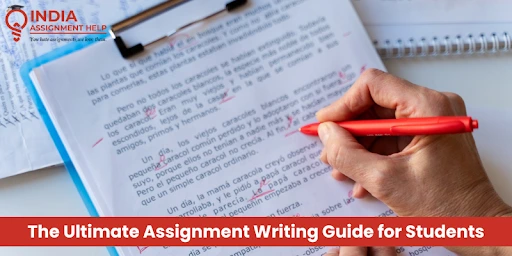Mastering Success: The Ultimate Assignment Writing Guide for Students

Assignments play a very important role in the academic journey of every student, serving as an assessment of their understanding, analytical skills, and ability to apply concepts learned in class. However, many students struggle with the interfaces of assignment writing, from understanding the requirements to structuring their work efficiently. When disheartened and demotivated, students are pushed to scroll down and refer to an assignment writing guide for students, where they can get all the answers to their questions. Stop scrolling, as the right guidance page is here! This comprehensive guide provides students with valuable insights and practical tips to navigate the assignment writing process successfully. From planning and researching to drafting and editing, this assignment writing guide for students covers every aspect of assignment writing, empowering them to achieve excellence and their academic goals.
A Brief Understanding of How Assignment ExpertsCraft an Assignment
Before starting writing, assignment writers read the assignment briefly and carefully to understand the requirements, including the topic word count, formatting guidelines, and deadlines. They identify the key instructions, such as the type of assignment, essay, report, or case study, for which they must search the required resources and list the assessment criteria. These assignment writers clarify with their instructor if they have any doubts or ambiguities to ensure a clear understanding of the task at hand.
The steps they list before starting the work and follow until its end are listed below. You can also refer to them to ease the challenges of crafting an assignment. But if the reasons are less time, low knowledge, or others, then you can consult these assignment experts and ease the burden of your work immediately.
1) Planning and Research
Professional assignment writers develop a detailed plan outlining the structure of your assignment, including the introduction, main body, and conclusion. They then conduct thorough research using credible sources to gather relevant information and evidence to support the assignment question's arguments. Staying organized and tracking their sources facilitates citation and referencing later in the writing process, making their work a masterpiece that was never created before.
2) Structuring the Assignment
These online assignment writers then craft a compelling introduction that grabs the reader's attention, provides context, and states the purpose of their excitement. The main body of the work is then organized into coherent paragraphs, focusing on the single idea or arguments supported by evidence and analysis. Ensuring smooth transitions between paragraphs and sections to maintain the flow of their writing and increase readability is their area of focus. The work is then concluded by summarizing the key points, reiterating your thesis, and offering insights or recommendations for further research.
3) Writing Style and Tone
Choosing an appropriate writing style and tone based on the assignment requirement and audience expectations makes them professional. These online assignment writers prefer using clear and concise language to effectively convey their ideas and findings, avoiding jargon or overly complex vocabulary that may obscure their message. Maintaining a formal tone while adhering to academic conventions, like avoiding contractions and using a third-person perspective in most cases, makes the writing original and authentic.
4) Referencing and Citation
Following the prescribed or asked referencing style, like APA, MLA, Chicago, Harvard, etc., is used to format the work. These are consistently used throughout the assignments to acknowledge the source and avoid plagiarism. The assignment writers cite all direct quotations, paraphrases, and ideas borrowed from other sources using inline citations and corresponding bibliographies or reference lists.
This is easy for them as they are familiar with the specific formatting requirement of the client’s suggested or asked referencing style, which includes the arrangement of elements like author name, publication dates, and page number.
5) Editing and proofreading
Proofreading the crafted work and editing it, if required, is the foremost responsibility of a professional assignment expert. Before delivering, they review the assignment carefully for grammatical, spelling, and punctuation errors that could undermine the clarity and professionalism of their work.
These online assignment writers check for logical coherence and consistency in their arguments and share that each paragraph contributes to the overall coherence of the crafted assignment. After doing it all, they seek feedback from peers, mentors, the quality check team, or writing tutors to gain fresh perspectives and identify areas for improvement before submitting their final draft.





